
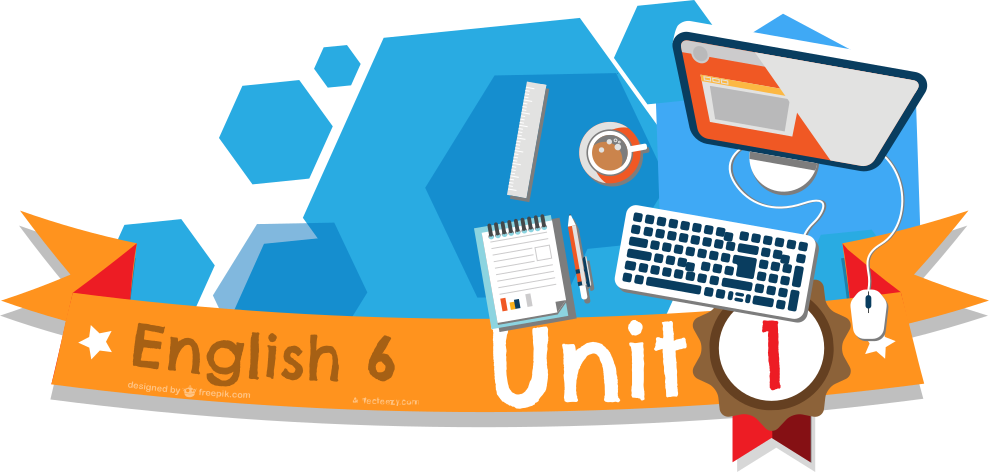
Teilziele: Media Time

Media time
Ich kann sagen, welche Medien ich jeden Tag benutze und wie oft. Außerdem kann ich erzählen, was ich in meiner Freizeit mache.
Describing people
Ich kann Personen beschreiben.
What were you doing?
Ich kann von Situationen und Ereignissen in der Vergangenheit berichten.
Telling a story
Ich kann einfache Geschichten erzählen.
Teacher Check: Media Time
Tasks: Media Time
Pocket-Project: Media and me


Tasks: On TV
Tasks: Media and free time
Tasks: Describing People
Tasks: What were you doing?
Tasks: Message in a bottle

Proof it! Unit 1
https://www.tutory.de/staatliche-realschule-bessenbach/dokument/rsb-lernwerkstatt-e6-unit1-media-time

Tasks: Media Time


Use the information from this task to fill in the following table.


https://www.tutory.de/staatliche-realschule-bessenbach/dokument/rsb-lernwerkstatt-e6-unit1-media-time

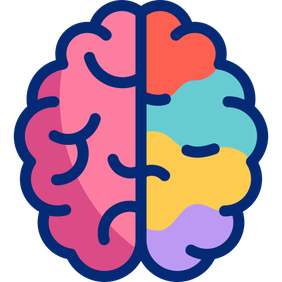
Input: Present Simple (Revision)
Correct the mistakes. Then discuss with a partner.
- She go to school every day."
Does he likes pizza?
They doesn't play football.
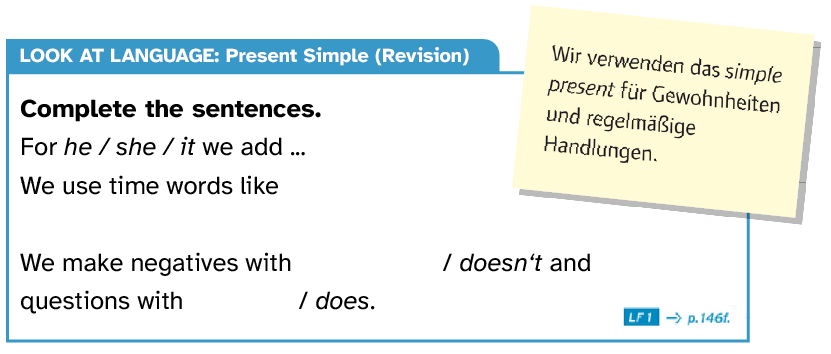
and .
Peter usually gets up at 7 O' clock.
The sun rises in the east.
She drinks tea every morning.

+
-
?
https://www.tutory.de/staatliche-realschule-bessenbach/dokument/rsb-lernwerkstatt-e6-unit1-media-time

Input: Present Progressive (Revision)
Form
Subject + form of (am/are/is) + verb + -ing
Example: She ________________ (read) a book → She is reading a book.
Use
Mit dem Present Progressive sagst du, dass jemand etwas tut oder dass etwas passiert.
Du benutzt das Present Progressive auch, um zu beschreiben.
Example: I am sitting in the classroom. The children in the picture are eating ice cream.
Signal words
, , ,
👉🏼
He ____ (play) football now. → He football now.
We ____ (write) English. → We English.
I ____ (not / watch) TV. → I TV.
Are ____ (they / read) a book right now? → Are a book right now?
Present Simple 👉🏼 He plays football every week. (regelmäßig)
Present Progressive 👉🏼 He is playing football now. (jetzt gerade)
+
-
?
https://www.tutory.de/staatliche-realschule-bessenbach/dokument/rsb-lernwerkstatt-e6-unit1-media-time

Pocket Project: Media and Me
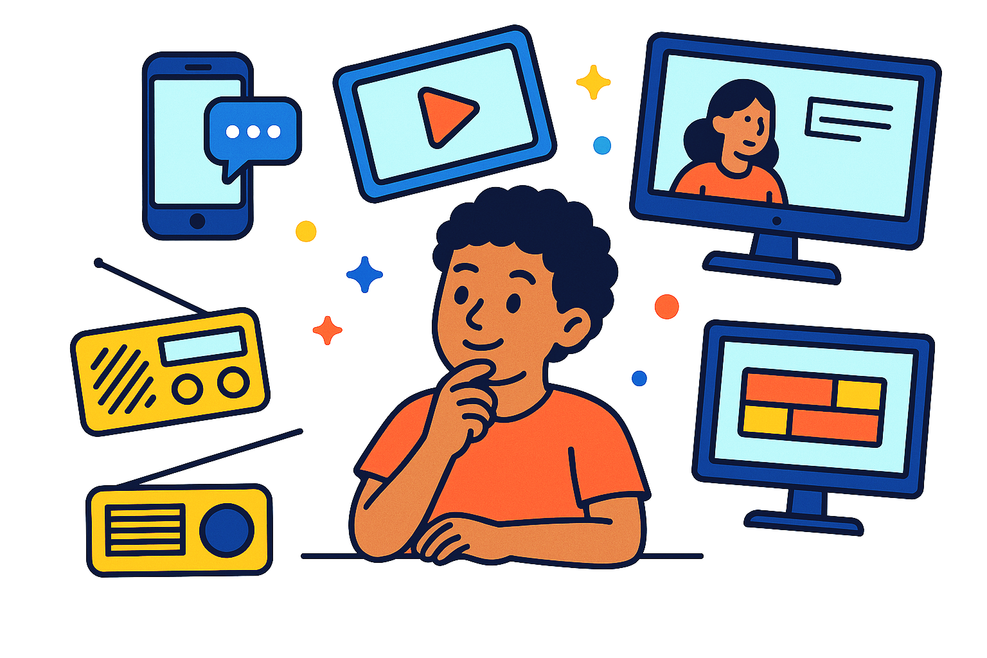
Step 1: Media Diary
Media means: TV, phone, tablet, computer, YouTube, games, music, etc.

Tuesday:
https://www.tutory.de/staatliche-realschule-bessenbach/dokument/rsb-lernwerkstatt-e6-unit1-media-time
Gehe in die Englisch-Werkstatt und wähle eine Partnerin/einen Partner für folgende Übung.


Step 2: Voice Recording
Tell each other: What media do you use most? What is your favourite?
Listen to your partner.
Ask questions: “Do you play games?”, “What is your favourite app?”,
I think the best programme for … is …


Bitte nehmt Rücksicht auf andere. Achtet auf angepasste Lautstärke, so dass alle bestmöglich lernen können.

Step 3: Create a Presentation
Media and me.
How to do it?
Use your ideas from the media diary and group talk.
Write or draw: What media do you use? Why do you like it?
Add pictures, drawings and record your voices.
Make your product colourful and interesting.


Step 4: Present & Reflect
What did you learn about media?
- Write 2–3 sentences in your notebook:
“I use …”
“I like … because …”
“I learned …

https://www.tutory.de/staatliche-realschule-bessenbach/dokument/rsb-lernwerkstatt-e6-unit1-media-time

Input: Past Simple (Revision)
https://www.tutory.de/staatliche-realschule-bessenbach/dokument/rsb-lernwerkstatt-e6-unit1-media-time

Tasks: On TV


From now on you'll find all the exercises in our ByCS Lernplattform course English 6.


Tasks: Media and free time











https://www.tutory.de/staatliche-realschule-bessenbach/dokument/rsb-lernwerkstatt-e6-unit1-media-time
Complete Kinga’s answers to the media survey (SB p.12) with the correct
form of the verbs in brackets. Use the simple present or the simple past.
I (look) at a TV website after school yesterday. I sometimes (check) this website to see when my favourite programmes are on.
Li and I (play) a video game at her house last weekend. I (not play) video games very often.
I (talk) to my friend Linda online yesterday evening. We usually (chat) online every day.
I (send) a text message to my sister this morning. I (borrow) her pullover. I always (tell) her that I have something of hers.
I always (love) watching sport on TV. I (watch) Manchester United vs. Real Madrid on Wednesday evening. Man Utd (won)!
I (use) the internet to look for information for a project in class this morning.
We often (look) online for information in school.
I (use) my computer, my phone and the TV yesterday. I (spend) five hours in front of a screen. I usually (watch) one or two hours of TV every day.
Die Signalwörter helfen dir, die richtige Zeitform zu wählen.
Ben is interviewing Li about her free-time activities. Complete the questions and answers with the
correct form of the verbs in brackets. Use the simple present or the simple past.
Ben: Hi, Li. What free-time activities (you / usually/ do) on Saturdays?
Li: I often (go) shopping with my mum in the morning and I sometimes (meet) my friends on Saturday afternoons. I (not do) sport on Sundays, but I always (practise) the piano and (take) lots of photos. I (love) my camera.
Ben: What free-time activity (you / do) yesterday?
(you / play) a sport, like hockey?
Li: No, I (not / do) sport yesterday. I (go) to the computer club, then I (watch) TV. After that, I (do) my homework.
Ben: (you /meet) your friends after school?
Li: No, I (see) my friends yesterday, but I (send) them text messages. They (not have) time to meet.
https://www.tutory.de/staatliche-realschule-bessenbach/dokument/rsb-lernwerkstatt-e6-unit1-media-time
Tasks: Describing People
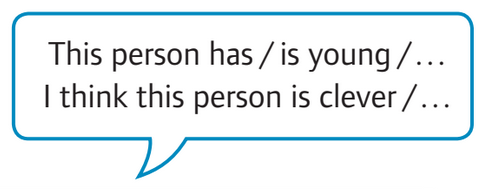
Write what the person looks like.
Write what you think the person is like.
Then tell your partner.







https://www.tutory.de/staatliche-realschule-bessenbach/dokument/rsb-lernwerkstatt-e6-unit1-media-time
Input: Past Progressive
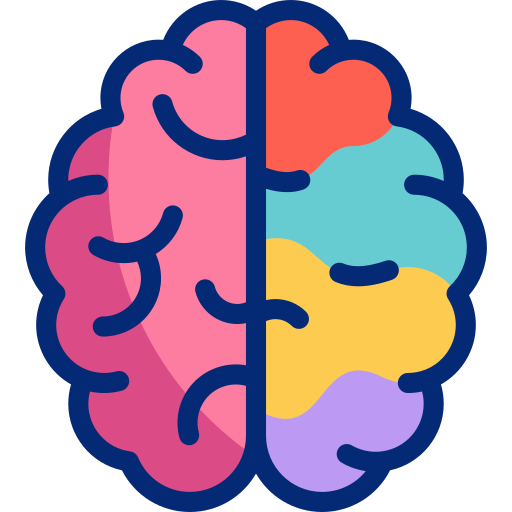
I talking to Rehan.
We talking about a new video game.
Amira standing near us.
I looking at her.
Positive: was / + verb + -ing
Negative: / weren't + verb + -ing
- ?—were—at—doing—11—What—youWhat were you doing at 11?
- standing—near—you—Who—was—?Who was standing near you?
Tasks: What were you doing?

First look at SB p.147 ff and
read LF 2 Past Progressive
.
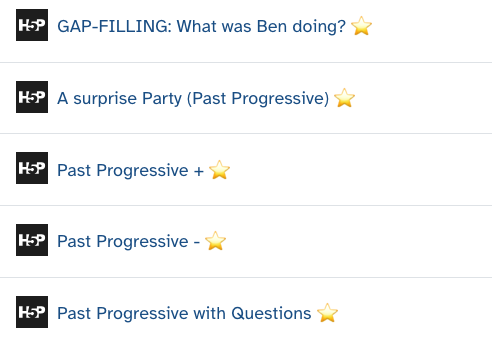

https://www.tutory.de/staatliche-realschule-bessenbach/dokument/rsb-lernwerkstatt-e6-unit1-media-time
Complete the sentences with the correct form of the verbs. Use the past progressive.
Jalen wasn’t reading (not read) a book, he was using (use) an app on his phone.
Kinga (not make) a video, she (talk) to her mum on the phone.
Ben and Marvin (not chat) online. They (play) football.
Li (send) a text. She (not do) her homework.
Malik and Jasmine (eat) sandwiches. They
(not drink) cola.
Leonie (take) photos with her camera. She (not talk) to Mr Taylor.
Trisha and Debbie (not play) volleyball. They (make) a video with their phones.
Ms Preston (not eat) an apple, she (talk) to Mr Jones.
Richie (not phone) a friend, he (write) a story for the school magazine.
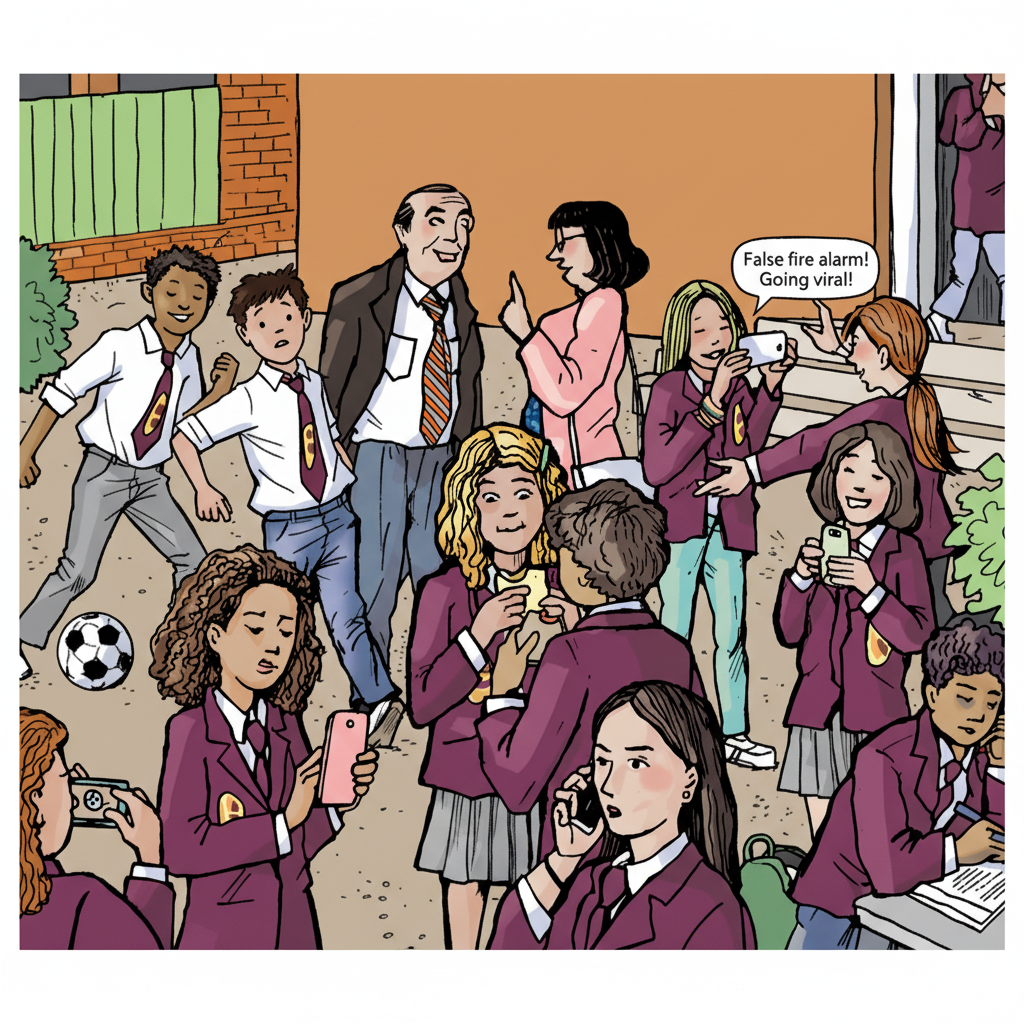
https://www.tutory.de/staatliche-realschule-bessenbach/dokument/rsb-lernwerkstatt-e6-unit1-media-time

Write the questions.
- afternoon—?—doing—yesterday—Kinga—was—WhatWhat was Kinga doing yesterday afternoon?
- was—Li—message—a—text—sending—?—WhyWhy was Li sending a text message?
- playing—Where—Ben—?—and—Marvin—were—footballWhere were Ben and Marvin playing football?
- Kinga—?—at—looking—TV—the—programme—How—wasHow was Kinga looking at the TV programme?
- ?—video—making—Trisha—a—Debbie—were—When—andWhen were Trisha and Debbie making a video?
- What—eating—Jasmine—Malik—and—?—wereWhat were Malik and Jasmine eating?
- phone—on—app—his—was—an—Who—using—?Who was using an app on his phone?
- was—to—?—Mr—Who—Taylor—talkingWho was Mr Taylor talking to?
https://www.tutory.de/staatliche-realschule-bessenbach/dokument/rsb-lernwerkstatt-e6-unit1-media-time
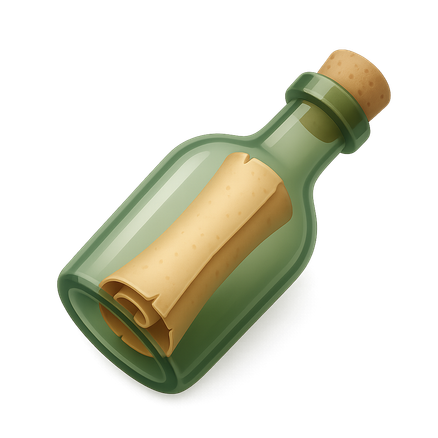
Tasks: Message in a bottle
Message in a bottle.


Read the story again. Complete the notes.
- Where did Laura find or see the message?
1st message:
2nd message:
3rd message: - What was the message like?
1st message:
2nd message:
3rd message: - What did the message say?
1st message:
2nd message:
3rd message: - How did Laura answer?
1st message:
2nd message:
3rd message:
Answer the questions.
- What does Laura think about the writer (boy or girl? / how old? / where from? / ...)?
- Who do you think the writer is?


https://www.tutory.de/staatliche-realschule-bessenbach/dokument/rsb-lernwerkstatt-e6-unit1-media-time

Your Check: Unit 1
Describing people. Can you find all of them?
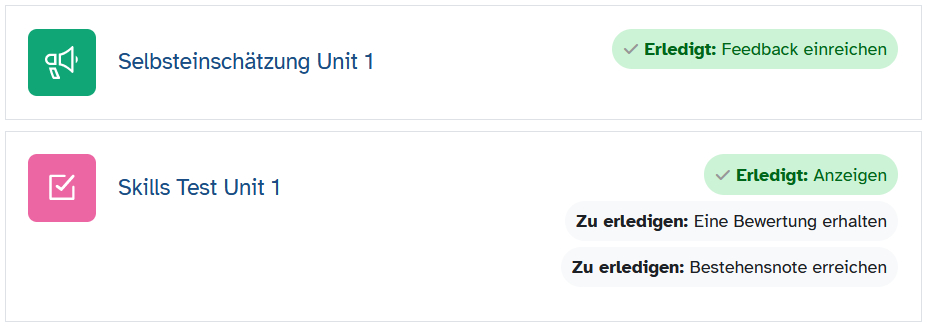
Check-out
https://www.tutory.de/staatliche-realschule-bessenbach/dokument/rsb-lernwerkstatt-e6-unit1-media-time


